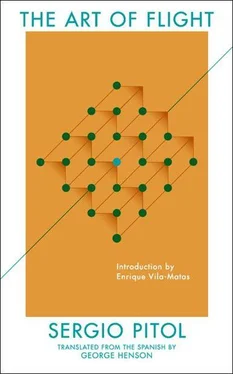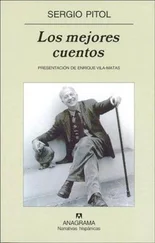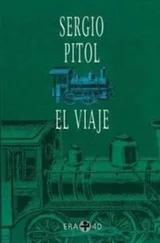In a world of insufferable yuppies, the name Borola is an anachronism. Recalling her sends me back to a vibrant time and a place now gone.
Xalapa, February 1996
TWO WEEKS WITH THOMAS MANN
13 JANUARY 1995
I returned to Mann’s diaries; the first volume. They comprise two different periods: the years 1918–21 and 1933–37. I was only familiar with the Spanish edition, a selection focused above all on his personal affairs, where is evidenced an attempt to discover the dark aspects — and secret areas — of the author’s life, which were already a source of scandal in Germany when the diaries appeared. The English version emphasizes, on the other hand, Mann’s political tribulations and moral dilemmas during those two especially troubling periods of his life. I read one edition and then the other, following a strict chronological order. This arrangement allows me a completely new reading, much richer than the partial reading I had done in Lanzarote when the Spanish version appeared. The first period comprises the end of the war in 1914, the defeat and sanctions imposed by the Allies. Mann had just published Reflections of an Unpolitical Man , a book in praise of Prussia, of drunken nationalism. By that time Mann was a celebrated writer whose life seemed to be collapsing around him. The German defeat stuns him. His hatred for a “French-style” democracy is brutal, and he renews the conflict with his brother Heinrich, the democrat and, therefore, the victor. His scorn for the concept of democracy leads him to make unimaginable leaps, completely unexpected and incompatible with his world for the purpose of hitting his target. On 24 March, 1919, at a moment of extreme agitation, he writes: “Rejection of the peace terms by Germany! Revolt against the bourgeois windbags. Let us have a national uprising now that we have been worn to shreds by the lying claptrap of that gang — and in the form of communism, for all I care; a new August 1, 1914! I can see myself running out into the street and shouting, ‘Down with lying Western democracy! Hurrah for Germany and Russia!’” 22This represents, of course, a momentary outburst. It is natural that he would not be attracted to the Bavarian Soviet Republic; it celebrates Heinrich, his enemy brother, excessively; what’s more, its tinge is too plebeian and Judaizing (Katia, his wife, is Jewish, but because she belongs to a very rich family it is as if she were not). The notebooks that contain this portion of the diaries were saved by chance. Mann used them to recreate the period’s atmosphere while he was writing Doctor Faustus . Fortunately, he did not include them among the other notebooks that were burned during his stay in California. As it turns out, he did not want to leave any testament in his diaries of his behavior before 1933, the year in which his political exile began. I read this portion of his diaries with astonishment, lamenting that there no longer existed a bridge that connected this moment to the beginning of the author’s conversion to the abominable cause of which he later became an apostle: democracy.
The diaries from both periods have something in common. In them we find the author in total defeat, lacking terra firma on which to stand. They are writings filled with turmoil and anger, with confusion, humiliation, and outbursts of irrational violence, physical and nervous illness. Mann is one of the authors whom I’ve read obsessively since adolescence. Calvino, in his Six Memos for the Next Millennium , considers The Magic Mountain to be the book key to understanding our century, because it contains the issues and problems that continue to concern us today. The Magic … is for me the most difficult test to which the spirit can be subjected, the very camera with which to reproduce the spectrum of a way of thinking. The fool will lose himself in the folds of its prose and will believe that its thousand pages contain a degree of foolishness comparable only to his own. There will also be those who approach the work with priestly veneration and will be, in spite of whatever they may think, the least apt to understand the book. Their fatuous severity will prohibit them from understanding Mann, a fundamentally parodic writer; a thinker, yes, but one who subjected thought to the corrosive acid of relentless irony.
24 JANUARY
A little over thirty years ago I met the great Polish writer Jerzy Andrzejewski. We met for the first time in Warsaw in a café in the Hotel Bristol to resolve some doubts that had arisen in my work. I was translating The Gates of Paradise at the request of Joaquín Díez-Canedo. I had the impression that the author did not care if the translation was good or bad. It seemed strange to him that his novel, which related an obscure medieval episode — the fantastical children’s crusade that marched toward Jerusalem to rescue the Holy Sepulcher from impious hands — would interest anyone in Mexico. He dealt quickly with the questions relevant to the book, and we then began to talk about other topics. He asked me about my professional experience. I listed among my translations Conrad’s Heart of Darkness . He seemed to perk up. He told me that the writers who most interested him were Joseph Conrad and Thomas Mann. Before the war, in his youth, he had become excited by a few French Catholic novelists, but the brutal experiences — the occupation, the destruction of Warsaw, everything that happened afterward — had erased that enthusiasm. He did not deny that Mauriac could be a competent storyteller, but thought his sermonizing was petty. Conrad and Mann had become giants for him during those dreadful years. Only the person who had read Doctor Faustus could understand the devastation to the soul caused by the German occupation. When he realized that I was able to speak with ease about those authors, Andrzejewski’s attitude changed. We went over the translation again, and he clarified a few things for me. And then he continued to talk about Conrad and Mann.
26 JANUARY
Kundera on The Magic Mountain : “Thus a vast background is meticulously depicted before which are played out Hans Castorp’s fate and the ideological duel between two consumptives: Settembrini and Naphta: the one a Freemason and democrat, the other a Jesuit and autocrat, both of them incurably ill. Mann’s tranquil irony relativizes these two learned men’s truths; their dispute has no winner. But the novel’s irony goes further and reaches its pinnacle in the scene where, each surrounded by his little audience and intoxicated by his own implacable logic, they both push their arguments to the extreme so that no one can any longer tell who stands for progress and who for tradition, who for reason and who for the irrational, who for the spirit and who for the body. Over several pages we witness an enormous confusion where words lose their meaning, and the debate is all the more violent because the positions are interchangeable.” 23
27 JANUARY
Reading Thomas Mann’s diaries, his memories of his children, of his wife, at times produces an uncomfortable feeling: there is too much intensity in the family drama, excessive complexities, the more evasive the account becomes the more shadows it casts; each fissure, each silence, seems to conceal a torture, an upheaval. One has a feeling of scrutinizing characters through a keyhole. We see only a part of the action; everything else remains in the shadows. It embarrasses us to be pilfering through other people’s lives and at the same time we cannot help but do it. A few months ago I experienced the same feeling of sneaking into a world where I was not invited when I visited the residence where Mann lived for a little over a decade in Pacific Palisades, a neighborhood of Los Angeles, with Efraín Kristal, a close friend and expert on Mann. We took advantage of the goodwill of the army of Mexican gardeners who were pruning the trees near the garden; our common language served as our password. Strolling the lawns, being on the terrace I had seen so many times in photographs where Mann usually took coffee with his family and a handful of privileged visitors, seeing the grove that surrounded the house with such grandeur that one can only classify it as Wagnerian, overwhelmed me with emotion. I imagined the wonder that the son of the North must have experienced each time he arrived home and happened upon a landscape comparable only to the beginning of creation, which he had glimpsed during his childhood in the albums or stories of his Brazilian mother. In that house Mann finished the last volume of Joseph and His Brothers ; it was there that he conceived, wrote, suffered, and finished Doctor Faustus .
Читать дальше












